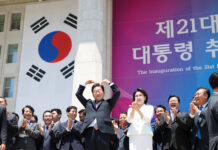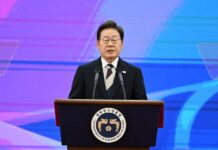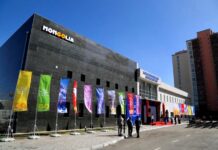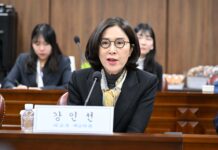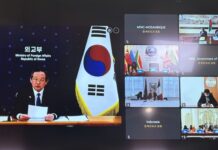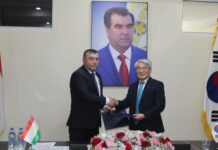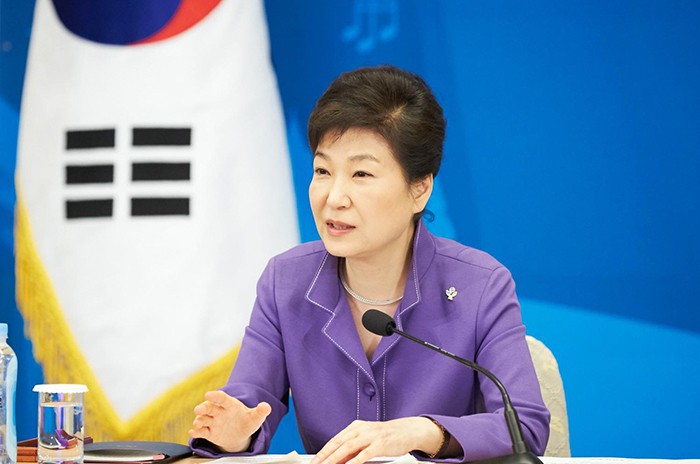
President Park Geun-hye speaks during a conference about how to strengthen national competitiveness in both the cultural and tourism industries, at Cheong Wa Dae on June 17.
On June 17, President Park Geun-hye denounced those who complain about how few tourists come to Korea, those who are unfriendly to tourists, and those who try to rip them off when there are too many tourists, such as by selling a single gimbab rice roll for as much as KRW 10,000. “These are acts that drive away our tourists,” the president said.
The president said that falsely advertised tour packages targeting mainland Chinese tourists, taxi drivers who overcharge their fares, and people who raise prices at traditional markets are all “grave cause for concern, and which tarnish the image of tourism in our nation.”
“It is crucial to improve the quality of our tourism industry, to root out such swindles and unfriendliness in restaurants and accommodations, by carrying out constant crackdowns and by providing proper guidance,” President Park proclaimed.
“I don’t think it’s right to say that, ‘Nothing but photographs will remain in our hearts.’ What lasts the longest in our hearts is the hospitality shown by the Korean people,” she said. “Reviving our beautiful heart, as shown by our ancestors and by the Korean people, will foster a friendliness that stays forever in the hearts of those who experience it. This is determined by having good content.”
Her remarks came in a conference about how to strengthen the nation’s competitive edge across the cultural and tourism industries. The conference was held at Cheong Wa Dae on June 17, and the theme was “Korea, a nation of heritage and tourism that you want to revisit.”
During the conference, President Park said, “Hoping to see more tourists, without a better tourism industry, is nonsense. Tourism is an up-and-coming part of the service industry, and represents our social infrastructure across all tiers of society, spanning our cultural capabilities, through to transportation and even a mature sense of citizenship, community and civic pride. The cultural and tourism industries provide a lot of job opportunities for youth and, also, serve as a catalyst for the development of other businesses.”
The president called for more efforts to continually seek and foster tourism-related business opportunities, to create a tourism environment free of any complaints, and, lastly, to create jobs for young people across the tourism industry.
“Tourists are concentrated mainly in popular cities, like Seoul and on Jeju Island. The benefits of such growth have been poorly distributed to provincial regions,” said President Park. “In order to kill two birds with one stone — to boost the domestic economy and vitalize provincial regions — representatives from across the tourism industry and provincial governments need to work together to enhance the quality of our heritage sites and cultural facilities,” she said.
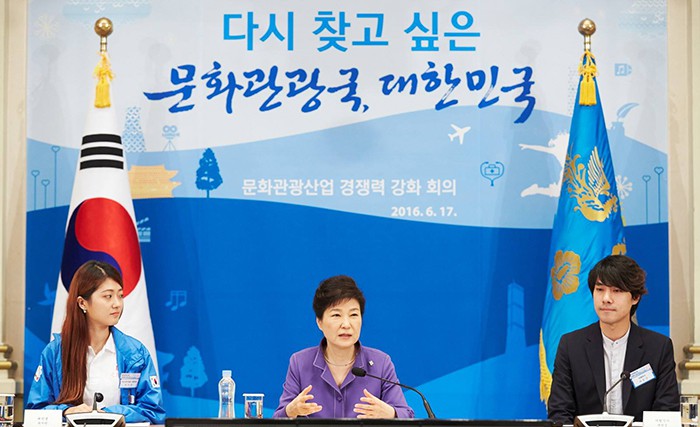
President Park Geun-hye (center) stresses the importance of treating tourists with hospitality and of attracting and satisfying more non-Korean tourists, during a conference about how to strengthen national competitiveness in the cultural and tourism industries, at Cheong Wa Dae on June 17.
The Ministry of Culture, Sports and Tourism launched its new tourism policy office in April this year, and since then this is the first time for Cheong Wa Dae to host such a conference. The talks aimed at dealing aggressively with any activity that could damage the nation’s strong reputation as a tourism powerhouse, such as falsely advertised tour packages, dishonest taxi drivers and other ripoffs. The conference was also designed to help increase tourist satisfaction rates when they visit Korea, and to increase their re-visit rate, all efforts aimed at helping to establish a basis for sustainable growth across the tourism industry.
During the conference, experts from the tourism industry discussed a variety of items, and finally came up with actionable measures. They vowed to: establish a booking system for express and intercity buses for non-Korean tourists; relax registration standards for tourism-related businesses; provide free-of-charge educational programs to train more interpreters and guides, especially in less well-known languages; and, lastly, revitalize the tourism industry in mountainous areas of the country.
By Wi Tack-whan, Sohn JiAe
Korea.net Staff Writers
Photos: Cheong Wa Dae
whan23@korea.k


